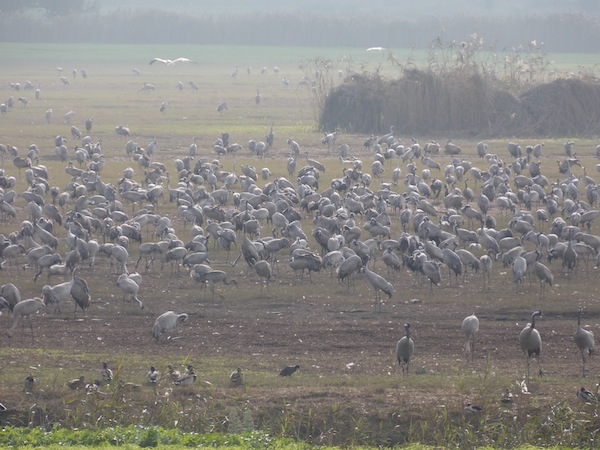Israel’s Hula Valley is a major stopping place for migrating birds. (photo by D.J. Tiomkin)
Jay Shofet, the director of partnerships and development for the Society for the Protection of Nature in Israel (SPNI), presented an overview of the broad range of work his organization does in addressing environmental issues in the Holy Land during a Nov. 19 webinar hosted by the Jewish Community Centre of Victoria with the Canadian SPNI.
With 35,000 member households in Israel and thousands more around the world, SPNI is the largest Israeli group of its kind. It engages in environmental lobbying of the Knesset and hopes to foster a love of nature through its endeavours. SPNI has delivered environmental education in the Israeli school system and is known for promoting the country’s hiking trails.
Shofet began with the history of the environmental movement in Israel and the “traditional Jewish call for wise environmental stewardship of the land.” It was from this concept that SPNI was founded, in 1953, by a group of scientists, teachers and kibbutzniks who were trying to prevent the draining of swamps in the Hula Valley in northern Israel.
Among the highlights of SPNI’s history is an initiative it spearheaded in the 2000s: a cross-border and environmentally friendly cooperation with Jordan and Palestine to use barn owls rather than pesticides to reduce the rodent populations in agricultural lands.
Israel houses what the United Nations refers to as a “global biodiversity hotspot,” Shofet said. “It’s important to note that Israel is a land bridge between three continents and four climatic zones.”
The numbers of bird and animal species in Israel exceed that of the United Kingdom; the country is also home to a wide variety of flora. Species from Europe, North Africa and Asia commingle with those native to Israel and the eastern Mediterranean. And, each year, Israel is a major migration route for hundreds of millions of birds, including pelicans, which makes the country a destination for birders.
Elsewhere, SPNI has been active in stopping what it believes to be the wrong type of afforestation, the introduction of trees in areas to which they are not ideally suited and that infringe on the natural habitat, such as the batha, a unique Mediterranean scrubland, or what Shofet called “the Serengeti of Israel.”
SPNI is in charge of blazing and maintaining the Israel National Trail and other parts of the more than 10,000 kilometres of trail systems in the country. “It’s a rite of passage for young Israelis to hike the Trail,” Shofet said about the INT.
Recently, the organization has focused on maintaining what Shofet described as a “sustainability mindset.”
“Renewable energy, moving away from fossil fuels, is what the environmental movement is about today,” he said. “Climate change is the organizing principle of the movement…. Our bottom line is to find nature-based solutions to mitigate climate change.”
At the top of current environmental issues for Israel is land-use planning, said Shofet. One of the densest populations of the OECD countries, Israel confronts obstacles in the use of its land. In 2015, SPNI lobbied to stop a group of business and political powerhouses, including former United States vice-president Dick Cheney and media tycoon Rupert Murdoch, from fracking in the centre of Israel.
Shofet emphasized that densely packed, sustainable cities like Tel Aviv are at the heart of protecting Israel’s biodiversity. “This is the only way to keep the open spaces open and to keep nature well-protected,” he said.
“Not all of Israel has to look like Tel Aviv, but Israel does have to build its cities in a smarter way and avoid suburban sprawl,” he told the audience. “Suburban sprawl is killing our open spaces and making life less interesting for people. Cities can be the solution to the environment. If the world had the global footprint of New York City, there would be no global warming.”
A niche for SPNI is urban nature. Such spaces are needed in green cities, said Shofet. To demonstrate this, he showed slides of the Jerusalem Bird Observatory near the Knesset, a place where schoolchildren and tourists alike visit and learn about ornithology up close, and Gazelle Valley Park, also in Jerusalem, Israel’s first urban nature reserve.
The final part of Shofet’s talk touched on the work SPNI is doing during the pandemic to try and ban Israel’s currently legal hunting season. As a start, SPNI has succeeded in getting the Ministry of Environmental Protection to call the laughing dove and the quail endangered species.
SPNI is also rehabilitating the nation’s rivers, trying to protect the diverse number of species and habitats found in its sea, promoting the use of solar energy, working to ensure that Israel has clean and accessible beaches, and encouraging the planting of trees in a way that is mindful of the country’s ecosystem.
Shofet’s concluding remarks offered a hopeful note to the current global environmental situation and Israel’s role in it, pointing out that the entrepreneurial spirit of the start-up nation is well-suited to tackling the challenges of adapting to the green economy.
For more information, visit natureisrael.org.
Sam Margolis has written for the Globe and Mail, the National Post, UPI and MSNBC.



